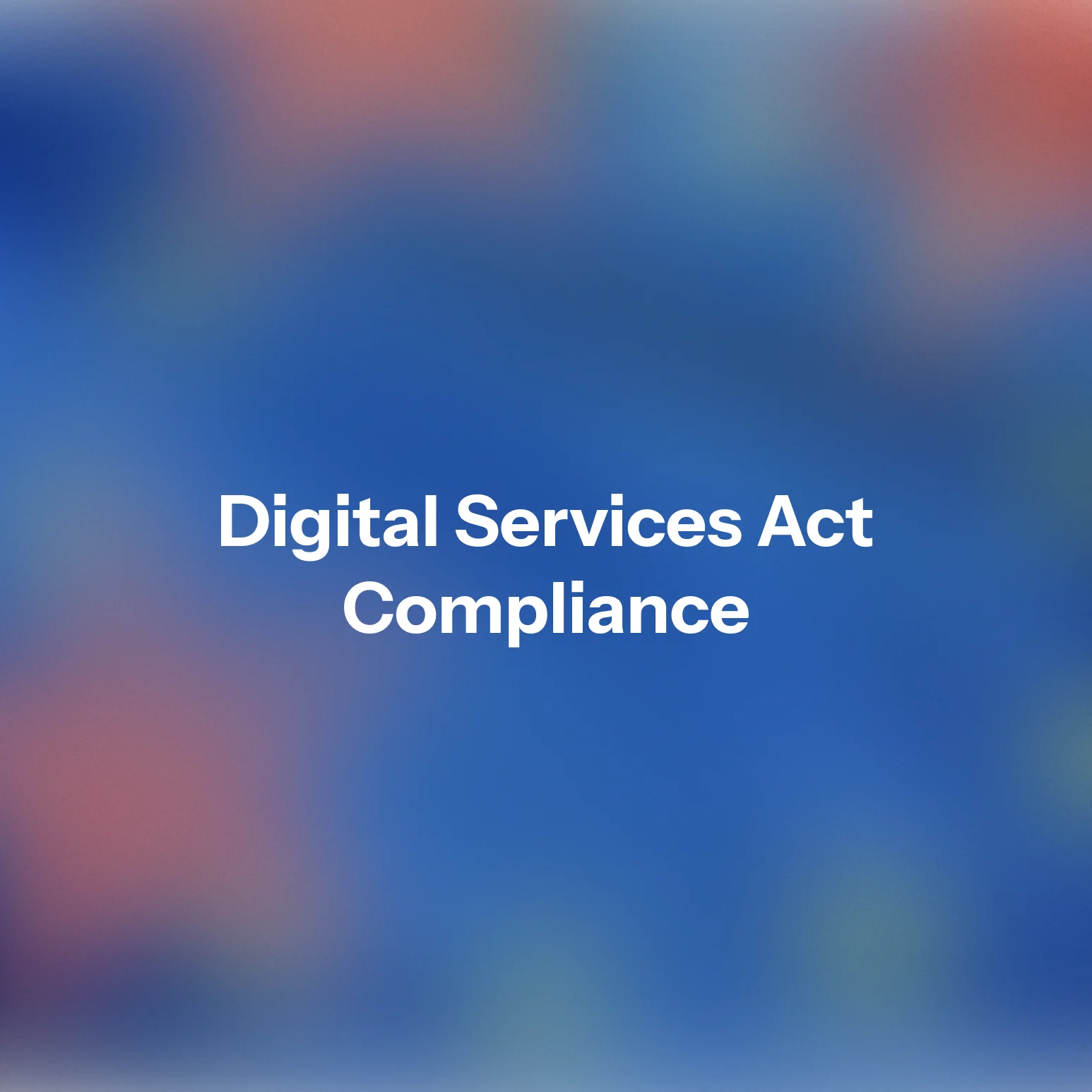EU Digital Services Act Platform Compliance Guide
The EU Digital Services Act requires platforms to moderate illegal content, conduct risk assessments, protect children, and maintain transparent content moderation practices. Non-compliance results in fines up to 6% of global revenue. SafetyKit provides AI-powered infrastructure with 200+ ready-to-deploy policies that enable platforms to achieve DSA compliance immediately.

What is the Digital Services Act?
The Digital Services Act is EU legislation that regulates online platforms, marketplaces, social networks, and content-sharing services. It applies to any platform serving EU users, with stricter requirements for Very Large Online Platforms (VLOPs) and Very Large Online Search Engines (VLOSEs) with 45+ million monthly active EU users.
The DSA entered into force in 2022 with full enforcement beginning in 2024. It creates a tiered compliance framework based on platform size and impact.
Who Must Comply with the DSA?
The DSA applies to platforms hosting user-generated content or facilitating user interaction, including:
- Social media and messaging platforms
- Online marketplaces and e-commerce sites
- Content-sharing and video platforms
- App stores
- Online travel and accommodation platforms
- Dating platforms and forums
- Search engines
Failure to comply results in fines up to 6% of global annual revenue, with active enforcement already underway by the European Commission.
Core DSA Requirements
All Platforms Must:
- Implement notice-and-action systems – Allow users to report illegal content and act swiftly on reports
- Provide transparency – Publish moderation policies and regular transparency reports
- Establish appeals processes – Let users challenge content decisions with timely responses
- Cooperate with authorities – Report illegal activities and respond to lawful information requests
- Prioritize trusted flaggers – Process reports from EU-designated expert organizations with priority
VLOPs and VLOSEs Must Also:
- Conduct annual risk assessments – Identify systemic risks including disinformation, election interference, and child safety threats
- Implement risk mitigation measures – Adjust algorithms, enhance moderation, and deploy protective features
- Complete independent audits – Undergo regular third-party audits verifying compliance
- Provide data access to researchers – Share platform data with vetted researchers for independent analysis
- Submit detailed transparency reports – File comprehensive reports on moderation activities and risk management
Advertising and Algorithm Transparency
- Disclose when content is advertising
- Allow users to opt out of targeted ads
- Ban profiling-based ads to minors
- Prohibit ads based on sensitive data (religion, politics, health)
- Explain how algorithms recommend and rank content
Child Protection Requirements
Platforms accessible to minors must implement high-level safety measures:
- Privacy-protective default settings for minor accounts
- Restrictions on addictive design features
- Age-appropriate content filtering and moderation
- Age verification for adult content
- Annual risk reviews focused on child wellbeing
How SafetyKit Enables DSA Compliance
SafetyKit's AI risk and safety platform helps enterprises meet DSA content moderation and child protection requirements without rebuilding trust and safety infrastructure. With over 200 ready-to-implement policies covering international child protection laws, platforms can start moderating content immediately and deploy compliant systems in days.
- Automated Content Detection: Identify illegal content across images, video, and text in real time, including CSAM, NCII, AI-generated deepfakes, fraud, violent extremism, harassment, and self-harm content. Support for 193+ languages ensures comprehensive coverage for EU markets.
- Child Safety Compliance: Deploy child safety compliance instantly with our built-in library of 200+ pre-configured policies covering international child protection laws. Privacy-protective defaults, enhanced content filtering, and specialized moderation workflows activate immediately—no custom policy development required.
- Risk Assessment Tools: Track content distribution patterns, recommendation outputs, and user exposure to harmful content by age cohort. Complete DSA-required risk assessments with quantitative data regulators expect.
- Transparency Reporting: Automatically generate DSA-compliant transparency reports. Log every detection, review decision, and enforcement action. Respond to regulator information requests in days, not weeks.
- Ad Moderation and Compliance: Moderate all submitted ads in real-time before they go live. Automatically detect and block ads based on sensitive data (religion, politics, health) or targeting minors, ensuring DSA compliance and platform-specific standards without manual review bottlenecks.
- Appeal Management: Streamlined systems for user appeals, decision explanations, and timely responses. All interactions logged and audit-ready for regulatory review.
- Regulatory Adaptation: Stay compliant as DSA requirements evolve. SafetyKit monitors regulatory developments and updates automatically with minimal engineering lift required.
Why Act Now
The European Commission is actively enforcing DSA requirements with substantial penalties. Recent investigations have targeted major platforms for child safety failures, advertising practices, and insufficient risk mitigation.
Organizations that proactively address compliance gain competitive advantages: reduced regulatory risk, stronger user trust, and operational readiness for future regulations. Other jurisdictions including the UK, Japan, and Brazil are implementing similar frameworks—platforms that establish strong DSA compliance now will be better positioned globally.
SafetyKit enables DSA compliance in under a week. Contact us to discuss your compliance strategy and learn how we protect users while meeting DSA requirements.
See how SafetyKit can help with risk and fraud
Get a personalized walkthrough based on “EU Digital Services Act Platform Compliance Guide”.

